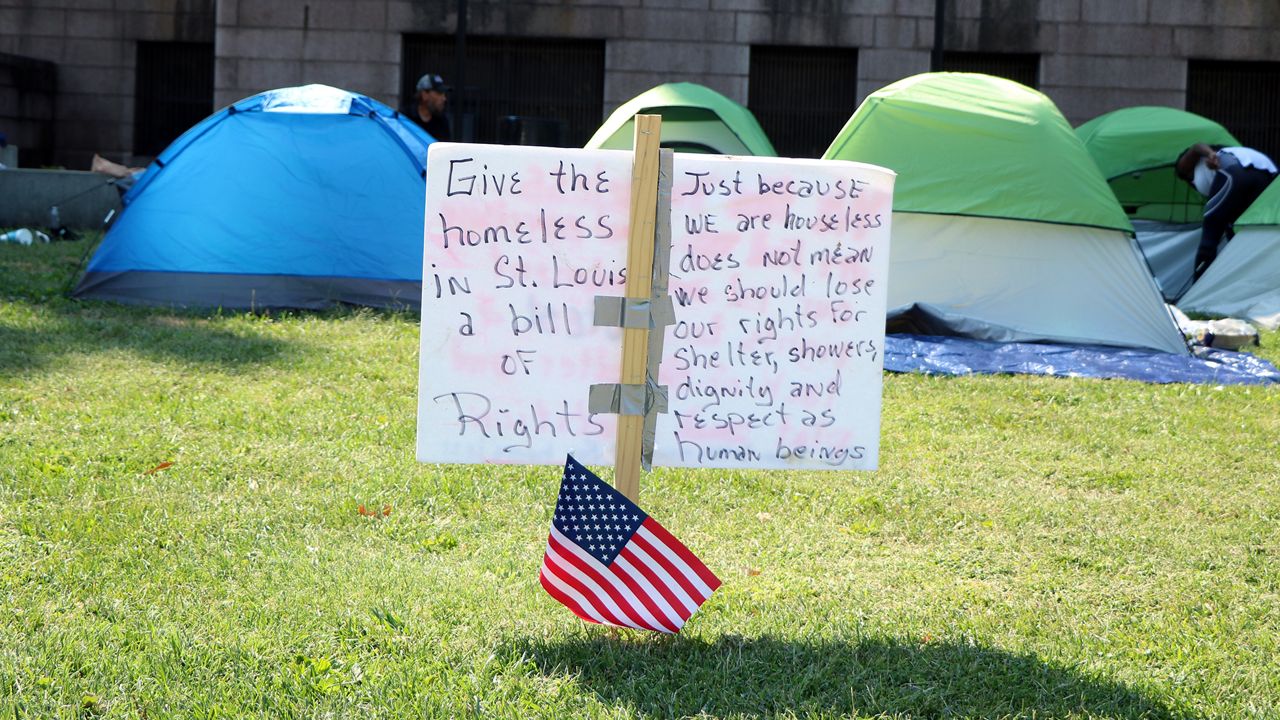ST. LOUIS — “You want to criminalize us, but you won’t give us a solution to what we’re doing wrong,” said JB, a representative of the unhoused community during a press conference Monday where St. Louis Board of Aldermen announced the introduction of an Unhoused Bill of Rights.
The announcement comes as a homeless encampment outside St. Louis City Hall has grown to more than 24 tents over the past several weeks. Signs outside the tents advocate for a homeless bill of rights.
The legislation would repeal ordinances that criminalize homelessness, guarantee protections for those displaced when intentional encampments are disbanded and amend the zoning code to broaden shelter access.
“A fundamental function of this legislation is to reassert the rights that our unhoused neighbors have, but as a result of the criminalization of poverty, their rights aren’t always ensured or enforced. They often face challenges as a result of their housing status,” said Alisha Sonnier, alderwoman for Ward 7.
Sonnier mentioned officials are working on decriminalizing panhandling and loitering, as well as laying the foundation for safe camping areas that would have designated areas for tents, showers, toilets and hand-washing stations.
“If we don’t create places for our unhoused to go, then they will create it for themselves,” Sonnier said. “Many of our unhoused neighbors need a place to go to become stabilized before they are ready to transition into shelters and a much smaller group of them do not want housing. And I want to be clear that this is their right.”
In the early 2000s, Aldermanic President Megan Green said St. Louis was nationally known as a model on how to address the unhoused community. However, “unfortunately, we have not kept up with that.”
As of now, Green said one in five school children are homeless or housing insecure, more than 1,200 people in St. Louis are homeless, and last year, more than 2,700 individuals used the city’s shelter system.
“The need for very affordable housing continues to grow as housing prices and rents have skyrocketed over the last few years,” she said.
In 2021, Green said the St. Louis Affordable Report Card found that the St. Louis region does not have enough affordable housing in general and there is a need for more than 28,000 one-bedroom units.
“I believe that once again we can be a national model for how to address homelessness,” Green said.
Monday’s press conference featured JB, Teri Dunn, director for Peter & Paul Community Services Center, Jerry King, co-founder and board member of Assisi House, in addition to Sonnier and Green.
“We find somewhere to go, they come to kick us out, but they don’t tell us where to go,” JB said. “It’s like sweeping the trash from one side to the other, only it’s not trash. These are human beings we’re talking about.”
Dunn said the need for shelters keeps increasing and people are living in shelters longer due to inflation.
“Money isn’t an issue for us. That’s not our problem. Our problem is being able to access more capacity so that we can have better opportunities to service our community,” she said.
The Peter & Paul shelter has a capacity of 60 beds and with individuals only able to stay six months at a time, Dunn said she has to decide whether to extend their stay or let in new people who need shelter.
“It’s a fixable issue. This is a human rights issue. This is not something that we can continue to sweep under the rug,” Dunn said.
One of the key provisions of the bill would be replacing the plat and petition process currently required by organizations that want to open shelters in neighborhoods.
An organization is required to go door-to-door to get signatures from 51% of property owners within 500 feet of a proposed shelter, which has been a major challenge for Assisi House since they began in 2014, King said.
“We’ve complained about that issue since we’ve opened,” he said. “I think you all know how difficult it is in an urban or suburban neighborhood to get 50% of the people to answer the door, much less to sign something that says this facility is going to come into the neighborhood.”
Green said over the past 15 years, none of the plat and petition for shelters have been successful and 13% of all special residential uses have succeeded in getting the signatures.
The plat and petition process would be replaced with a conditional use hearing process, used for other businesses, which would “give stakeholders an earnest opportunity to work collectively to design spaces and agreements that ultimately set our most vulnerable neighbors on a path towards stability, while also satisfying resident concerns,” Green said.
“We hope that this change can be made to the ordinance to allow us and others to continue to serve a need in a way that does not impact one neighborhood in a negative way,” King said.
Other key provisions of the bill as stated:
- Remove barriers to creating more shelters and bed space
- Ensure neighboring residents have meaningful oversight of small-scale shelter operators
- Housed residents living near a proposed or established shelter can express their concerns during public hearings at Board of Adjustment meetings
- If a shelter violates municipal public nuisance statute, residents can request a revocation hearing with the Board of Adjustment
Sonnier will introduce the legislation this week, and while the encampment outside of City Hall is still active, she expressed urgency for the bill as “winter is coming.”
“We know the death and devastation that our cold weather can cause,” she said.
Sonnier also mentioned that the legislation will not be perfect and what “makes it across the finish line” will not be perfect either.
“I know that we will always have some flaws that will be noted and need to be buffed and polished,” she said.



